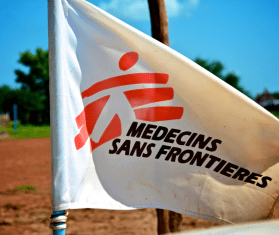NEW YORK/PARIS, JUNE 15, 2022—A new mobile application called Antibiogo that was developed and tested by Doctors Without Borders/Médecins Sans Frontières (MSF) to help facilitate the diagnosis of antibiotic resistance was recently certified in Europe. This Conformitè Europëenne (CE) mark means the app is one step closer to being available free of charge to health care workers worldwide—providing a new innovative diagnostic option to tackle a major public health issue.
This application enables non-expert laboratory technicians to measure and interpret antibiograms, the tests used to determine if bacteria will respond to particular antibiotics. Antibiogram tests are essential as they help doctors prescribe the most effective antibiotics. They are usually interpreted by highly trained microbiologists. However, in low- and middle-income countries (LMICs) that do not have the equipment necessary to carry out antibiograms or enough clinical microbiologists to interpret them, the identification of antibiotic resistance is much more complicated or even impossible, creating more opportunities for individual and community resistance to form.
“Thanks to Antibiogo, any microbiology laboratory technician anywhere will be able to read and interpret an antibiogram directly on their telephone—online or offline—and know the resistance profile of the bacteria responsible for a patient’s infection,” said Dr. Nada Malou, head of the Antibiogo program. “Properly used, it is a fantastic new diagnostic tool which will help to ensure wider access to high-quality bacteriological tests even in the absence of microbiologists. This will make it possible not only to treat patients with the most appropriate antibiotics but also to reduce antibiotic resistance.”
Antimicrobial resistance, including antibiotic resistance, is recognized by the World Health Organization as a major public health threat and caused 1.27 million deaths in 2019. It could become the leading cause of mortality with 10 million deaths per year globally from 2050 onwards if nothing is done to curb resistance. MSF has been involved for several years in the fight against antibiotic resistance, particularly in countries in conflict where MSF treats war-wounded patients infected with multidrug-resistant bacteria.
The vast majority of diagnostic tests for antibiotic resistance that exist are developed in high-income countries with profits in mind. Tests that are made available and affordable to people in LMICs are often not well-suited for these contexts. For example, many low-resource settings are not adapted to store tests due to issues like high temperatures, humidity, and unreliable electricity sources, as well as a lack of trained specialists.
“Antibiogo is innovative in that it was created based on the need identified in countries with limited resources, was developed with users in these countries and with their data, and was tested in the populations which are going to benefit from it,” Dr. Malou said. “The development model of this medical device is the reverse of the one we usually observe and meets the real needs observed in LMICs.”
Antibiogo uses image processing, artificial intelligence technology, and an existing expert system that includes thousands of interpretation rules from European or American societies for microbiology used to read and interpret antibiograms. Results from clinical trials that were organized in Mali, Jordan, and Senegal by the Pasteur Institute show a very high level of consistency, ranging from 90 to 98 percent depending on the bacteria when compared to interpretations by qualified microbiologists.
The Antibiogo mobile application was specifically developed by the MSF Foundation—an MSF entity that initiates, funds, and manages technology and innovation projects to improve care for patients—and will be used first in MSF laboratories in Mali, Central African Republic, Jordan, and Yemen this summer. This will allow MSF to collect user feedback and performance data under real conditions, which is necessary for the next step of CE certification. That next level of certification will allow the application to be deployed more widely and used by health care professionals in all LMICs. Many countries, especially countries with limited resources, do not allow tests to be used if they are not CE certified.
MSF’s Antibiogo application to tackle antibiotic resistance certified in Europe




